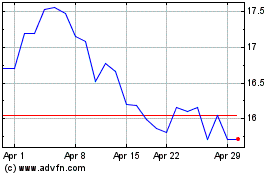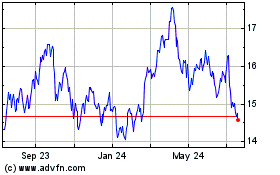Spain's Repsol Faces $5.5 Billion Claim From China's Sinopec--Update
June 17 2016 - 11:24AM
Dow Jones News
By Selina Williams and Razak Musah Baba
Repsol SA said it faces a $5.5 billion arbitration claim from a
Chinese state-controlled energy firm in the latest problem to crop
up from the Spanish oil company's biggest-ever acquisition.
Sinopec International Petroleum Exploration and Production Corp.
and its subsidiary Addax Petroleum U.K. are seeking compensation to
cover their initial investment in 2012 in a partnership in the
British North Sea with Talisman Energy Inc., a Canadian company
that Repsol bought last year for $8.3 billion, excluding debt.
The claim also includes a demand for lost opportunities in a
British joint venture that has stakes in 57 North Sea oil and gas
fields and related infrastructure, including pipelines and
processing facilities, Repsol said. The company didn't say where
the arbitration had been filed.
Repsol on Friday said the $5.5 billion claim is groundless and
has been classed as "remote risk" by the firm's legal advisers.
Repsol said the claim reflected Sinopec's feeling that the U.K.
investment "has not delivered the results expected."
Addax and Sinopec weren't immediately reachable for comment.
The news is the most recent wrinkle for Repsol's acquisition of
Talisman completed in May last year.
The Talisman deal was meant to bring new production capacity for
a company that saw a large portion of its resources wrested away by
a populist Argentine government in 2012. Folding in Talisman, a
Canadian owner of shale acreage and offshore oil rigs, nearly
doubled Repsol's daily oil output and lowered the Spanish company's
exposure to volatile Latin American economies by increasing its
exposure to North America.
But the purchase expanded the Spanish company's debt as revenues
and profits fell during a prolonged oil-price slump.
Repsol announced the transaction at the end of 2014, some six
months into what has become a two-year long rout in oil prices that
has forced the entire industry to rein in spending as their
revenues and profits have plummeted.
At the time of the deal's announcement in December 2014, oil
prices had already more than halved from the mid-summer peak of
around $115 a barrel. However, oil prices failed to recover into
2015, as had previously been forecast by executives and analysts,
as a supply glut filled up crude storage tanks and weighed on
markets.
Amid the fall in oil prices, Repsol's profits have plunged and
the company has lowered its dividend. Its cost-cutting efforts in
recent quarters have done little to dent the company's expanding
debt load. Analysts have pointed to the company's "stretched"
balance sheet as a risk.
Repsol's net debt was EUR12 billion ($13.47 billion) in the
first quarter of this year, slightly higher than in the previous
quarter while its net profit was EUR434 million, down 43% from a
year earlier.
Repsol's share price has fallen around a third since it
announced the deal, more than the 17% fall in the oil price over
the same period and underperforming its European oil and gas peers,
reflecting investors concerns over the company.
Write to Selina Williams at selina.williams@wsj.com and Razak
Musah Baba at Razak.Baba@wsj.com
(END) Dow Jones Newswires
June 17, 2016 11:09 ET (15:09 GMT)
Copyright (c) 2016 Dow Jones & Company, Inc.
Repsol (QX) (USOTC:REPYY)
Historical Stock Chart
From Jun 2024 to Jul 2024

Repsol (QX) (USOTC:REPYY)
Historical Stock Chart
From Jul 2023 to Jul 2024
